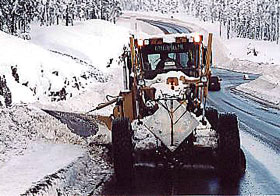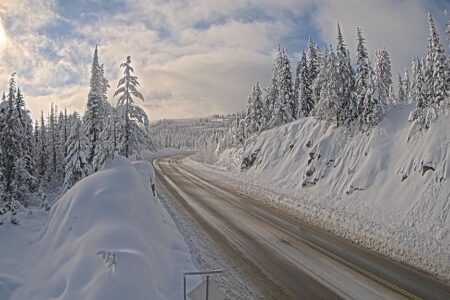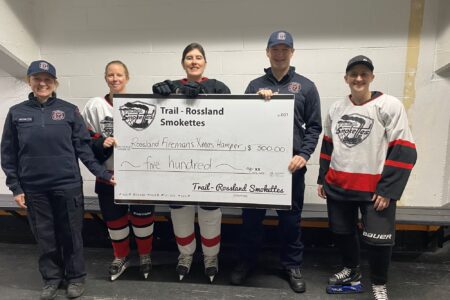Conflicting views on local highway maintenance
As the winter’s toll of motor vehicle accidents and inconveniences mounts, concerns in the community have grown that inadequate highway maintenance is putting the public at risk.
At the core of the debate is whether restrictive provincial budgets and corner-cutting private contractors have (or haven’t) resulted in poorer standards of maintenance since the contracts were privatized in 1988, or since provincial supervision was reduced in 2003.
Data from ICBC suggests that there has been no discernible increase in winter accidents, but the correlation is complicated by psychological effects—drivers typically compensate for worse conditions through slower, more cautious driving.
Rosslander Ed Davies worked in highways maintenance for three decades, first under the province, then under Bell (1988 to 1991), and finally under Emcon whose contracts in the Kootenay Boundary began in 1991 and continue to the present. Emcon’s most recent contract began in 2003 and expires next year, 2013, on Oct. 1.
Now retired, Davies has been plying both the province and the contractor with evidence, he feels, of Emcon’s corner-cutting that has put our highways below provincial standards and put the public in unnecessary danger.
When the contracts were first privatized on Oct. 21, 1988, and Bell Maintenance got the local contract, Davies reported that the province “required contractors to maintain the same amount of men, equipment and maintenance yards.” Furthermore, the Ministry of Transportation maintained “four area manager inspectors on the road making sure the contractors maintained the highways to provincial standards.”
“Privatization was working fine then,” Davies said, speaking highly of Bell’s dedication to quality, safety, and its employees.
When Emcon underbid Bell and took over the contract in 1991, Davies perceived a marked change in the management style. According to Davies, the profit motive was, and continues to be, Emcon’s top priority, over and above public safety and employee satisfaction.
Emcon disagrees.
“I’m not going to comment on inaccurate or speculative statements by a former employee who is obviously disgruntled,” said Joe Mottishaw, Kootenay Boundary Division Manager for Emcon. “He was an operator that did good work for us at the time,” Mottishaw said about Davies, but “the same maintenance standards exist today as were brought in in 1988. There will never be cutbacks to the level of service on the road.”
2003 was another turning point, according to Davies: “This was when privatization started to fail to the point we are now. The Road Builders Association wanted a ten year contract and wanted to monitor themselves,” namely with no more provincial inspectors. “The ministry gave the contractors what they wanted,” he said, leading to “dangerous roads, poor service, accidents, injuries, and deaths due to poor highway maintenance.”
In a letter to Nicole Phaland-Fraser of the Ministry of Transportation, Davies has written, “When highways were first privatized, our area had four area manager inspectors: Ron Haywood and Stephanie Gillis [in] Grand Forks, Robin Valentine [in] Rossland, and Wayne McGreger [in] Castlegar. They were on the road every day making sure Emcon was meeting highways maintenance standards. They were constantly having to force Emcon to do things required in the contract and to do things in accordance with the maintenance standards.”
“Emcon just hated them!” Davies wrote. “So you can just imagine what it’s been like over the last ten years without these inspectors.”
“We have three inspectors for this area and an operations manager that oversees us,” countered Mottishaw. “They do between 30 and 40 independent audits each year.”
Darrell Gunn, Ministry of Transportation District Operations Manager for our area, in Grand Forks, said there was one supervisor in Trail for our immediate area and two others in the Kootenay Boundary service area.
Earlier this month, Gunn had a lengthy phone conversation with Davies, followed by a long discussion over coffee the following day.
Gunn explained that Emcon is on a tight operating budget and is doing a good job for the ministry. He considers Emcon to be one of the better contractors, and that area supervisor Gerry Popoff is doing a good job for Emcon.
Davies countered, “Gerry Popoff has no respect for the public, the ministry, or the employees. Emcon management are shareholders and are going to do what’s best for the company, not the public.”
Davies pointed out that 71 trucks had required towing up the Trail hill last year, and this year more than 40 trucks have been towed, numbers which he said are “way above normal.”
Gunn maintained that truck traffic in the area is high and trouble on the Trail hill begins with only a small amount of snow.
Davies said, “I went away with the impression that he was a spokesperson for Emcon, not the Ministry of Transportation.”
Since 2003, Davies said Emcon has made serious cutbacks to staff and equipment. He worries that fewer trucks and fewer employees working longer shifts means neglected, unsafe highways. His evidence is anecdotal, with stories on a similar theme of Emcon arriving too late to the scene, or neglecting certain stretches of road, such as the highway down to Paterson and the Nancy Greene highway.
As an employee, Davies said he felt Emcon made it difficult to maintain the high standards he had been accustomed to under Bell and the ministry.
“That’s the Emcon way,” Davies said. “Fast and cheap as possible. You weren’t allowed to do a good job.”
“They cut winter shifts from three a day to two and cut down on the number of men on winter shifts,” Davies said. The Rossland, Fruitvale, and finally Castlegar yards were closed, and Emcon “started an early retirement buy out to get rid of full time employees.”
Davies estimates that Emcon has saved $500,000 per year since it chose not to replace 14 retired employees. The cost, he said, is lost experience. In particular he noted that new plow drivers used to be mentored for at least one week by experienced drivers, but now drivers are put on the road alone without such hands-on training.
Instead of maintaining full time employees, Emcon uses subcontractors and auxiliary workers when they’re needed. Davies dismisses this system as ineffectual, since the time lag between a call out and the need for highway service is too great. On call workers may not be disposed to work when the call out is made, Davies added delicately.
Mottishaw said that the Ministry approved Emcon’s business plan in 2003 as able to provide the same or better service as before.
“There are no delays,” Mottishaw said, because weather forecasts are used to “preplan, to a far greater extent each year than we did the year before.”
“Emcon started to get rid of equipment,” Davies continued, noting that subcontractors are expected to fill the void, and he claims that Emcon equipment isn’t always to standard.
“They wouldn’t sipe truck tires, saving $35 a tire, but then the trucks had no traction and couldn’t go anywhere,” he said. “You had to have a load of sand for traction. This put operators lives in danger. We ran for two years that way.”
At another time, “under-licensed tandems couldn’t haul a legal load,” he said, and “Emcon almost lost their facility repair and inspection license for maintaing their own equipment because they weren’t keeping proper maintenance records, they weren’t filing or filling out driver’s logs records properly, and they were not keeping up with the equipment maintenance schedule. The Ministry of Transportation warned them several times and even took trucks off the road.”
At one point, Davies said, “Emcon started cutting back or eliminating salt in the winter sand to save money. Sand started freezing in the pit, so they had to put screens in the pits.” Time was lost as drivers had to screen their sand before hitting the road.
Worse, “sand started freezing inside the sanders on the trucks one night when I was working,” Davies said. “Six frozen trucks were in the shop thawing out instead of being on the road sanding.”
“Our families drive these highways too, we’re not going to neglect anything. We believe in what we do,” Mottishaw said.
He argued that privatized highways maintenance had led to “smarter and more innovative” approaches with “better equipment.”
“We have bigger equipment and faster equipment,” he said. “We have winged or extendable underbody plows that can do three or four times the work of the little four-tons the ministry used to have [prior to 1988]. They increase our productivity greatly.”
Another recent purchase, the “tow plow,” does “two lanes and the shoulder, all in one swoop,” Mottishaw said.
Winter isn’t the only problem according to Davies. “Emcon hasn’t done any culvert maintenance for the last ten years,” he said, bemoaning the sorry state of drainage on several sections of local highway. “It was routine annual maintenance with the ministry and with Bell.”
“We do extensive checks,” Mottishaw said. “We’ve had no major washouts or floods in the area because of that. We’ve learned. We’ve been in the business for 21 years; we know where the hot spots are.”
Davies, however, rattled off a number of culverts that he claims have been well below ministry standards for years, in addition to two landslides onto local roadways that he says need to be dealt with right now.
“There are people out there who have higher expectations,” Mottishaw said, “but we can’t do anything about that. We have a quality management system. We have planning and training sessions with our people. We get inspected by the ministry night and day. We do our best.”
























